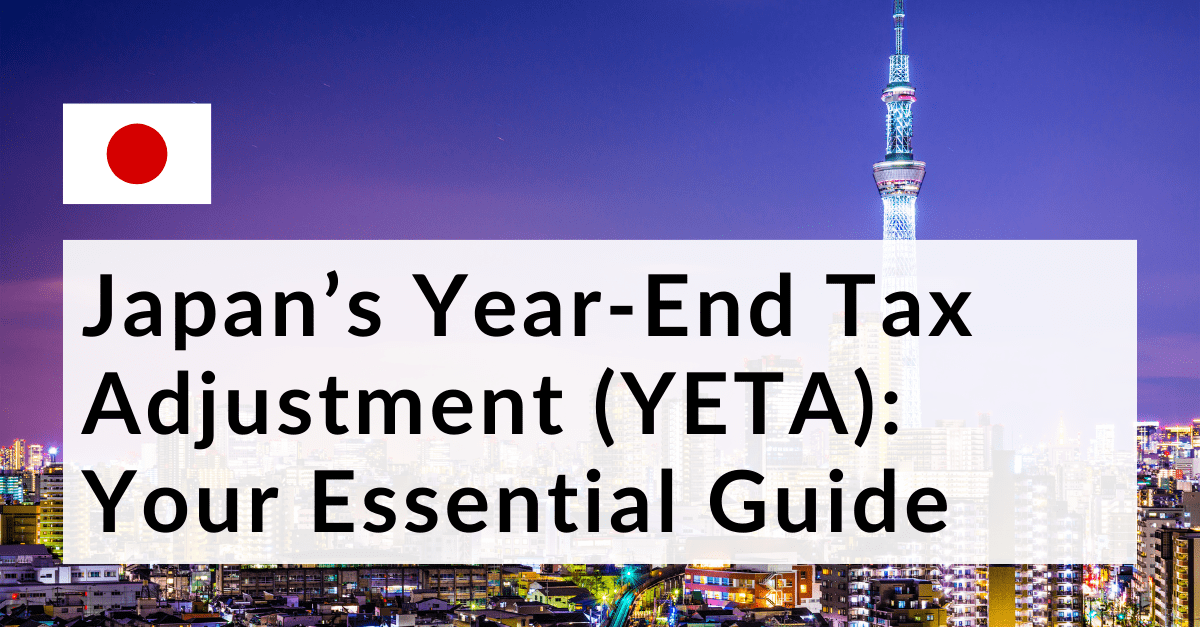Table of Contents
ToggleIf you’re a business owner with employees in Japan or are planning to expand your business here, it’s important to understand Japan’s year-end tax adjustment (YETA) system, also known as Nenmatsu Chosei.
YETA plays a significant role in the country’s tax landscape. As an employer, ensuring compliance with YETA will not only help you fulfil your tax obligations but also benefit your employees. It involves adjusting the withholding tax amount based on various factors such as employee salaries, bonuses, allowances, and social insurance premiums.
Japan has a dual filing system that encompasses income tax and municipal tax with different tax periods, and this can be quite complex, especially if you’re not familiar with the process. The good news is that online filing systems such as E-Tax and eL-Tax can help simplify this process.
In this blog, we’ll guide you through the essential documents and steps required for the year-end tax adjustment, including the role of the withholding tax statement and the year-end tax adjustment declaration. We’ll also cover how employers can assist in the process, common mistakes to avoid, and how an Employer of Record (EOR) is able to help you with Japan’s year-end tax adjustment.
Understanding Nenmatsu Chosei: Japan’s Year-End Tax Adjustment System
YETA is a crucial process for adjusting tax payments. It must be completed by the end of the year, with the necessary documents submitted by January 31 of the following year. It applies to employees residing in Japan who are subject to this adjustment, while freelancers and self-employed individuals need to file a final income tax return.
By effectively navigating through this process, you can minimize the risk of underpaying or overpaying taxes, avoiding potential penalties or financial complications. The year-end tax adjustment system allows businesses to accurately calculate and adjust the amount of income tax withheld from employee salaries, ensuring that the correct amount is remitted to the tax authorities.
Employee salaries form the foundation of the calculation, as they are the primary source of taxable income. Bonuses, on the other hand, can significantly impact the tax liability for both employees and employers. It is essential to accurately include bonuses in the year-end tax adjustment calculation to avoid any discrepancies. Allowances, such as housing or transportation allowances, also factor into YETA. These allowances are typically considered taxable income and should be included in the calculation.
Additionally, social insurance premiums paid by both employees and employers also contribute to YETA in Japan. These premiums include health insurance, pension, and employment insurance contributions. It is important to accurately report these premiums, as they can affect both the withholding tax amount and the overall tax liability.
To effectively navigate through YETA, employers should ensure that they have accurate and up-to-date records of employee salaries, bonuses, allowances, and social insurance premiums. By keeping meticulous records, businesses can minimize the risk of underpaying or overpaying taxes.
Furthermore, businesses should stay informed about any changes or updates to YETA. The Japanese tax laws are subject to revisions, and employers must stay updated on any changes that may impact the year-end tax adjustment process, such as earthquake insurance premiums and life insurance. By staying informed, businesses can ensure compliance with the latest requirements and avoid potential penalties or legal issues. Additionally, employers need to be aware of the Final Income Tax Return (Kakutei Shinkoku), which is an essential part of the year-end tax adjustment in Japan.
In addition to accurate reporting and calculations, employers should also prioritize communication and transparency with their employees regarding the year-end tax adjustment. Employees need to understand how their salaries, bonuses, allowances, and insurance premiums are being factored into their tax liability. Clear and open communication can help avoid confusion or misunderstandings regarding the tax adjustment process and ensure that employees know their responsibilities and rights.
Employers can provide employees with detailed explanations or guidelines on how YETA works. This can include information on the various components that contribute to the calculation, such as salary income, bonuses, allowances, and social insurance premiums. By educating employees about these factors, employers can help them understand how their taxes are being calculated and why certain amounts are withheld from their paychecks.
By conducting this year-end adjustment, employers settle the discrepancy between withheld tax and the actual taxable amount, avoiding penalties and ensuring compliance. YETA helps taxpayers reconcile their annual income and tax liabilities, ensuring a smooth and accurate tax payment process.
The Japan National Tax Agency (NTA) provides a comprehensive guide on its website for making tax adjustments, which includes information about how to calculate deductions, fill out the papers, deduction rate tables, and legal changes.
The Dual Tax Filing System: Income Tax and Municipal Tax
Japan’s tax system encompasses both national income tax and local municipal tax. While income tax is paid to the national government, municipal tax is paid to local authorities.
This dual filing system ensures the proper distribution of tax revenues. Each tax has its own set of rules and regulations for filing and payment, which must be understood for accurate tax compliance.
It’s worth noting that online filing systems like E-Tax and eL-Tax are available for tax purposes in Japan. While the system does have some English references, it is primarily in Japanese, making it challenging for non-Japanese speakers to navigate.
The online filing systems offer step-by-step guidance and automated calculations; they save time and ensure accurate tax filings, benefiting both taxpayers and tax authorities.
How does Tax Deduction Work in Japan?
Tax deductions in Japan work by allowing individuals and businesses to reduce their taxable income, thereby reducing the amount of tax they owe. There are various types of deductions available in Japan, including:
1. Basic deductions: These are standard deductions that everyone is eligible for, regardless of their specific circumstances. The amount of the basic deduction depends on factors such as age, marital status, and whether the taxpayer has dependents.
2. Special deductions: These are additional deductions that can be claimed for specific expenses, such as medical expenses, education expenses, and donations to charitable organizations. The specific requirements and limits for each type of special deduction vary.
3. Business deductions: Businesses can deduct certain expenses related to their operations, such as rent, utilities, salaries, and business-related travel expenses. However, there are specific rules and limitations on what can be deducted.
It’s important to note that tax deductions in Japan are subject to specific rules and limitations. It’s advisable to consult with a tax professional or refer to official tax resources provided by the Japanese government for detailed information on how tax deductions work in Japan and how they may apply to your individual or business situation.
Preparing for YETA: Essential Documents and Steps
Proper preparation is essential for Nenmatsu Chosei, Japan’s year-end tax adjustment (YETA). Gathering relevant documents like income statements, receipts, and expense records is necessary for accurate tax calculations.
Organizing financial information helps streamline the filing process and minimize errors. It’s crucial to take note of important deadlines and submission procedures to ensure compliance.
Consulting a tax professional or Employer of Record company with tax and accounting services such as Eos, can provide guidance and assistance throughout the preparation process.
Additionally, Japanese residents who fulfil either of these categories below as of 31st December of that year have to disclose them in a separate annual report and not part of the income tax return:
- earning more than 20 million JPY annually, or
- hold at least 300 million JPY of gross fair market value worldwide assets, or
- at least 100 million JPY of exit tax on financial assets.
What Role Does the Withholding Tax Statement Play?
The withholding tax statement plays a crucial role in the YETA process. It provides a summary of taxes withheld from income, helping taxpayers reconcile their actual taxes paid with the withholding amount. Understanding this statement is essential for accurate filing and calculating the final tax liability or refund.
How Can Employers Assist in the YETA Process?
Employers play a vital role in Nenmatsu Chosei by providing necessary documents and information to employees. They should issue accurate withholding tax statements and communicate filing deadlines and requirements clearly. Employers can also offer resources and assistance to help employees understand the tax adjustment process, ensuring smooth filings.
What Happens When YETA is Not Submitted Properly?
When the Year-end Tax Adjustment (YETA) is not submitted properly, it can lead to various consequences and complications for taxpayers, including the potential for penalties and fines imposed by the tax authorities. One of the most immediate effects is the potential for penalties and fines imposed by the tax authorities. These penalties can vary depending on the severity of the non-compliance and may include financial repercussions, such as a reduction in the tax refund that taxpayers are eligible for.
In addition to penalties, failing to submit YETA accurately can also result in inaccuracies in tax calculations. This can lead to underpayment or overpayment of taxes, causing potential disputes with tax authorities and additional administrative burdens.
Moreover, not submitting YETA properly can impact future tax filings as well. Tax authorities may view non-compliance as a red flag, leading to increased scrutiny in the future. This could result in audits or investigations that can be time-consuming and stressful for taxpayers.
Furthermore, failing to submit YETA properly can also affect employees’ individual tax situations. Without accurate withholding information, individuals may not receive the correct amount of tax credits or deductions they are entitled. This could lead to higher tax liabilities or missed opportunities for refunds.
To avoid these potential complications, taxpayers must ensure that their YETA is submitted accurately and on time. Employers should provide clear guidelines and resources to help employees understand the tax adjustment process and fulfil their responsibilities. This may include providing training sessions, informative materials, or access to tax professionals who can assist with any questions or concerns.
In addition, employees should double-check their YETA submissions for accuracy before submitting them to the tax authorities. It is important to review all relevant documents, such as salary statements, withholding certificates, and deductions, to ensure that the information provided is complete and correct.
By taking these steps and being proactive in understanding and fulfilling their tax obligations, employees can help ensure a smooth filing process and avoid any potential issues that may arise from non-compliance with the Year-end Tax Adjustment (YETA) in Japan.
Common Mistakes to Avoid during YETA
When it comes to Nenmatsu Chosei, there are common mistakes that you should avoid to ensure a smooth tax adjustment process. First and foremost, it’s important to plan and avoid the last-minute rush, as this can lead to errors and inaccuracies.
Double-check all income and deduction information to ensure its accuracy, and keep track of any changes in your employment status throughout the year. Make sure you understand the deadlines and requirements for submitting your final tax return, as missing them can result in penalties. If you have any doubts or questions, don’t hesitate to consult with a tax professional or Employer of Record company with tax and accounting services for guidance.
The Role of an Employer of Record like Eos Global Expansion
Employers can simplify the Nenmatsu Chosei process by partnering with an Employer of Record (EOR) like Eos Global Expansion, which has expertise in Japanese tax regulations and can handle payroll, tax filings, and compliance on behalf of businesses. Eos Global Expansion has been in the Japanese market for more than a decade and has ensured accurate Nenmatsu Chosei filings and timely payments, including withholding income tax, to Japan’s national tax bureau.
By leveraging EOR services, employers can streamline the tax adjustment process, saving time and effort. Additionally, EORs provide withholding tax statements that include information on taxes paid and salaries, aiding in the year-end adjustment process. Collaborating with an EOR such as ours simplifies Nenmatsu Chosei for businesses expanding in Japan.
Conclusion
Navigating the year-end tax adjustment process in Japan can be complex and time-consuming. However, with the right guidance and support, you can ensure compliance and minimise the risk of costly mistakes. This guide covers the essential documents and steps required for YETA, including the crucial role of withholding tax statements.
We have also highlighted how employers can assist in the process and common mistakes to avoid. If you’re looking for expert assistance with Japan’s year-end tax adjustment, consider reaching out to us today. Our team of professionals is well-versed in Japanese tax regulations and can provide you with comprehensive services to streamline the process and ensure compliance. Contact us today to learn more about our services and how we can assist you in optimising your year-end tax adjustment in Japan.







